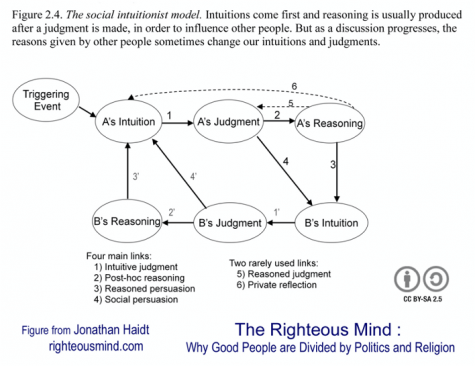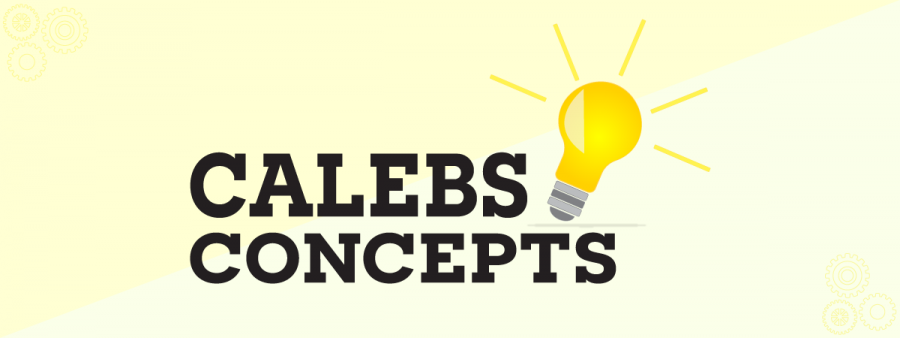Caleb’s Concept: Impeach Trump. But not for insigating a riot
February 20, 2021
Donald Trump was a terrible president. From refusing to concede the election to his questionable handling of COVID-19, there is never a short supply of controversy following the former president. However, despite his many shortcomings, Trump’s Jan. 6 speech should not be an impeachable offense. Here is why.
As an intricate species of animal, our decisions are difficult to interpret and understand. Until recently, fields like economics made predictions about humans based on assumptions of rationality. However, new research in cognitive neuroscience and behavioral economics shows that this assumption often does not hold. In his 1994, masterpiece “Descartes Error,” neuroscientist Antonio Damasio proposes a theory that guides decision-making called the somatic marker hypothesis. This process originates through the interaction between the ventromedial prefrontal cortex and the amygdala, an important mechanism for formulating positive and negative emotions. The amygdala is located within the limbic system and is responsible for innate reactions to events in our lives. In a complicated chemical interaction, this information is processed by the ventromedial prefrontal cortex, which is responsible for reasoning through our emotions, memory and more.
To highlight this process here is a paper finding that associations with hot or cold drinks changes our perspective of others. This process occurs because the hypothalamus, the part of the brain responsible for regulating bodily temperature, is connected to the amygdala, which is responsible for processing emotions. This ultimately affected the frontal cortex’s ability to “accurately” perceive an interaction independent of innate response to the external environment.
If you’re still awake, let’s observe how neuroscience affects real world decision making and moral reasoning! In his 2012 magnum opus, “Righteous Mind,” moral psychologist Jonathan Haidt gives us this chart depicting the psychological underpinnings of moral and social behavior:

This model tells us that in the context of decision making, we have a primary intuition that influences our action. This is followed by an after the fact justification of that behavior that is used to influence behavior and can be influenced by discussing this position with other people. To illustrate this point let’s analyze the violent actions of jihadists oftentimes allowing people to make the unfair assumption that Islam causes violence. For example, it is more common to find passages of violence in the Christian Bible, than the Quran which implies that violent passages in a book do not cause violence. Rather, it is the interpretation of Islam by jihadists that results in bloodshed.
This has important political implications in the U.S. in today’s day and age. On Jan. 6 domestic terrorists stormed the Capitol in an attempt to overturn a legally binding election, resulting in the deaths of five people. Democrats and some Republicans were correctly outraged at the blood shed during the Capitol Insurrection. Begging the question, if Trump accepted the election like an adult then would this event have happened?
In October, 13 domestic terrorists were arrested by the FBI after plotting to kidnap Michigan Gov. Gretchen Whitmer. Many blamed Trump for this conspiracy because most of the terrorists supported him, yet, Trump never hinted at kidnapping Whitmer. Therefore, Trump’s rhetoric doesn’t cause domestic terrorism. Depicted below is Trump’s speech the source of controversy:
So we are going to, we’re going to walk down Pennsylvania Avenue — I love Pennsylvania Avenue — and we are going to the Capitol. And we are going to try and give — the Democrats are hopeless, they are never voting for anything, not even one vote — but we are going to try to give our Republicans — the weak ones because the strong ones don’t need any of our help — we’re going to try and give them the kind of pride and boldness that they need to take back our country. So let’s walk down Pennsylvania Avenue.
Observe it is never explicitly stated to enter the building. Yes, Trump is wrong to promote a conspiracy theory to remain in power. However, claiming his rhetoric is responsible for what transpired on Jan. 6 is not grounded in scientific evidence. In his 1949 article, Nicolas Pastore claimed that progressives are more likely to embrace ideas of environment influencing behavior, while conservatives believe in a genetic basis. In reality, behavior is a complicated interaction between genetics and environmental influences. This is illustrated by evolutionary cognitive neuroscientist Steven Pinker’s classic “The Blank Slate: The Modern Denial of Human Nature.”
The arguments Democrats use about Trump’s rhetoric causing the insurrection is based on data decades out of date. This author is not against the impeachment of Donald Trump for impeachable behavior. Trump’s rhetoric is an after the fact justification for unacceptable behavior, not a causal force responsible for what occurred on Jan. 6, thus, not impeachable.












soundos • Feb 23, 2021 at 3:40 am
great post.